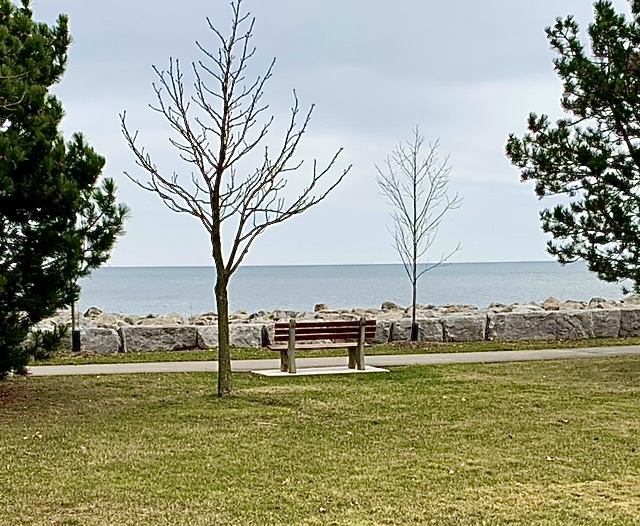
I had a random encounter over the holidays - one that I wish I’d handled differently.
Shortly after Christmas, I was enjoying my daily walk along the Bronte waterfront. The trail was quiet, with very few people on the path. A brisk wind stung my cheeks as I listened to the beautiful sound of waves crashing on the shoreline. Diving ducks and swans peppered the surf. They bobbed up and down, then disappeared in a bottoms-up display, searching for underwater aquatic treats.
Winter trees along the walkway stood like guardians of the lake, blessing me with their energy as I passed. Many of them had bronze name plaques at their bases to honour a deceased loved one. It was a peaceful setting where I could lose myself in the goodness of a deep connection with nature.
The people I meet on my walks are generally friendly, and most of them offer a greeting or a simple nod. As I passed a particular bend in the trail that curved around the lake, there was a young man sitting quietly on a bench. A boy really, to a woman my age.
He was well-dressed, clean-cut, probably in his late teens or very early twenties. He had a long, narrow face with a sallow complexion and was slouched deep into his black parka. Although he sat very still, staring out at the water, his gaze shifted from side to side in a nervous kind of energy.
As I came closer, I studied the young man and saw a heavy cloud of sadness in his eyes.
When I passed him on the bench, he looked away. I tried to make eye contact to say hello, but he worked hard to ignore me by turning his head in the opposite direction. I sensed he was struggling with something deep and important to him. The lake is a good place to think, I thought to myself and walked on.
On my return trip, the boy was still sitting on the bench. He stared down at his feet when he saw me coming. This time, I slowed my pace to get his attention, and I said hello as I passed. He answered with a quick hello, like a cat pouncing on a mouse, then looked away. It was like he was expecting me to say something and dreading it at the same time. I could feel his anxiety in my bones, and I could hear his body language screaming at me – please don’t stop, please don’t notice me. I walked the rest of the way home thinking about the look in his eyes.
Now, here I am, several days later, and I’m still thinking about that young man. Who was he, and why did he look so sad? Did he need someone to talk to? Was he afraid of something or someone? Did he have a fight with a parent, a friend, or a girlfriend? Was he sick or grieving the loss of a loved one? Whatever it was, my instincts told me he was in pain.
As a writer, I’m always an observer of people. We all walk through our days carrying the baggage of the lives we live, some of us wearing our scars more prominently than others. It’s comfortable to experience humanity at a safe distance and imagine what’s going on in other people’s lives.
I’m always on the lookout for a good story, so could I have created a drama where none existed? Could the young man have been there, simply enjoying some scenery and solitude? Absolutely, that’s possible. My imagination has a way of stirring things up and turning them upside down. But either way, the encounter stayed with me.
Looking back, I wish I had stopped and sat beside him. I wish I had asked him how he was and if he lived nearby. I wish I had engaged and at least tried to soften his sorrow. I wish he knew that an old woman walking on the trail cared about his sadness.
In the ubiquitous world of technology and the ravages of Covid, we’re losing our humanity and willingness to personally connect with people. Compounded by the growing hate and violence in the world, we can become afraid to reach out to strangers. And while that’s a valid argument in many cases, what was it about this innocuous young man that stayed with me? The look in his eyes? Was it his body language, as skittish as a squirrel?
I realize that his business is none of my business. But isn’t a fellow human being seemingly in distress my business? Most of us would reach out to help someone in an obvious health crisis, like a fall or a heart attack. But what about sadness, loneliness, and despair?
If you met this boy on a bench, what would you do? Would you trust your instincts and take a seat beside him? Or would you walk away like I did? There’s a fine line between being friendly and being intrusive. There’s always the possibility of being rebuffed and experiencing the sting of rejection when we put ourselves out there. But isn’t there some solace in knowing we tried?
I don’t know what the answer is here, and every situation is different. All I know is that I’m going to do better. If that means sitting down next to a boy on a bench who looks like he’s having a tough day - I’ll be there.


